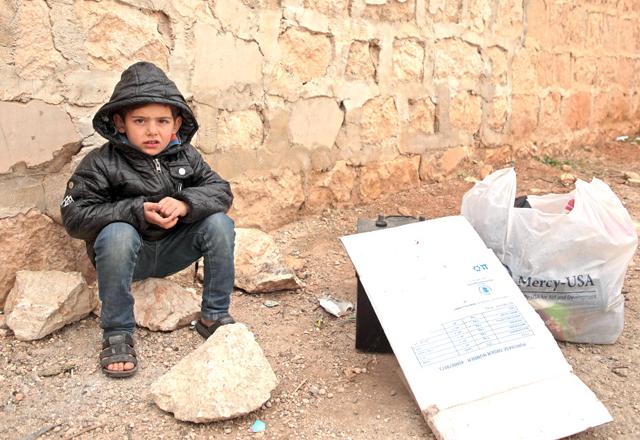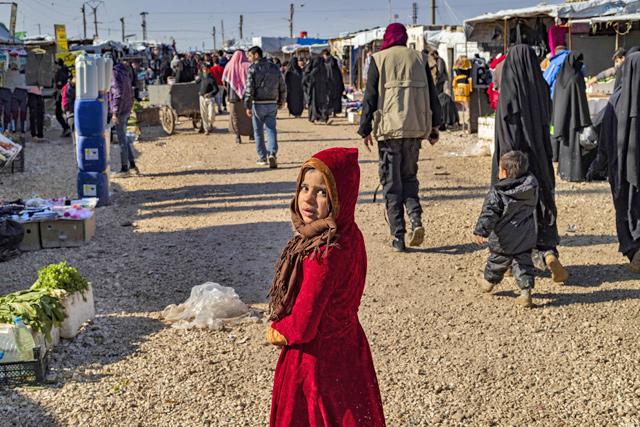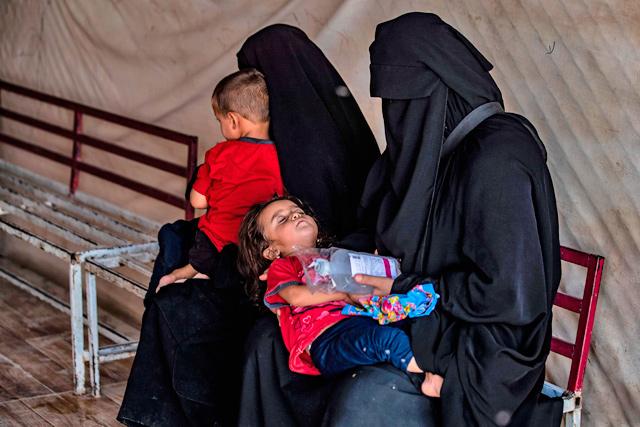You are here
More than 500 dead in Syria's Al Hol camp in 2019 — medics
By AFP - Jan 16,2020 - Last updated at Jan 16,2020

A displaced Syrian boy sits on the ground next to belongings in Khan Al Assal town in Syria's north-western Aleppo province on Thursday (AFP photo)
AL HOL CAMP, Syria — At least 517 people, mostly children, died in 2019 in an overstretched Syrian camp housing displaced people and relatives of the Daesh group extremists, the Kurdish Red Crescent told AFP on Thursday.
The Kurdish-run Al Hol camp in northeastern Syria is home to around 68,000 people who are reliant on humanitarian assistance, especially during the harsh winter months.
A Kurdish Red Crescent spokesperson said 371 children were among the 517 people who died in the squalid tent city last year.
Malnutrition, poor healthcare for newborns and hypothermia were among the main causes of death among children, Dalal Ismail told AFP at the camp.
"The situation is tragic and the burden is huge," she said, adding that foreigners were among the children who died.
Syrians and Iraqis form the bulk of the camp's residents but Al Hol is also home to thousands of foreigners, mainly relatives of Daesh fighters who are kept in a guarded section of the camp under the watch of security forces.
Aid shortage
Kurdish authorities say they are holding 12,000 non-Iraqi foreigners, including 4,000 women and 8,000 children, in three displacement camps in northeastern Syria. The majority are being held in Al Hol.
Jaber Mustafa, an official in the camp, said that assistance delivered by aid groups is "not enough" to address the "great suffering" of residents.
Medicine and food baskets are among the most pressing needs, he told AFP.
The Kurdish administration in north-eastern Syria this week warned that humanitarian conditions in Al Hol could deteriorate further after the UN Security Council on Friday voted to restrict cross-border aid.
The Yaroubiya crossing on the Iraqi border was a key entry point for UN-funded medical aid reaching northeastern Syria, including Al Hol.
The UN had used it to deliver some medical supplies that the Syrian government had not permitted via Damascus.
Yaroubiya’s closure will disrupt “60 to 70 per cent of medical assistance to Al Hol”, Abdel Kader Mouwahad, director of humanitarian affairs in the autonomous Kurdish administration, told AFP.
This leaves Syria’s Kurds with the unofficial Zamalka crossing with Iraq’s autonomous Kurdish region, which is not used for UN aid.
The fate of foreign extremists and their relatives detained in the Kurdish region of Syria has been a politically difficult issue for their countries of origin.
Countries such as France and Belgium that have large contingents of nationals in such camps have been reluctant to bring them home while the Kurds warn they cannot keep them much longer.
Winter
UN investigators on Thursday called for at least the children to be repatriated, notably because their lack of papers put them in a “particularly precarious” situation.
“This, in turn, jeopardises their rights to a nationality, hinders family reunification processes and puts them at a higher risk of exploitation and abuse,” a report by the UN Commission of Inquiry on Syria said.
Some families have been stuck in limbo at Al Hol camp for more than a year and are experiencing their second winter.
“The humanitarian situation is terrible, we don’t get enough aid,” said one woman who gave her name as Amina Hussein, and who was displaced from one of the last bastions of the now defunct Daesh “caliphate” in 2018.
“The cold is biting and rain floods our tents,” said the young women, who wore a full niqab face veil and cradled her 18-month-old asthmatic son.
“His condition gets worse when I switch the heater on and we have no medicine,” the young mother said.
Every day, queues of women — some of them in wheelchairs and others walking with crutches — form in front of one of the Kurdish Red Crescent clinics in the camp.
“They only take in 50 people a day, so we sometimes wait from 6am to 9pm without even managing to register our names,” said Zeinab Saleh, a 28-year-old Iraqi mother of four.
“So we come back the next day.”
Related Articles
AL HOL CAMP, Syria — Kurdish authorities said they transferred 21 orphans from a squalid displacement camp in northeast Syria on Saturday, i
AL HOL CAMP, Syria — Maha Al Nasser queues in front of a crowded clinic in Syria's Al Hol camp, her frail daughter squirming in her arms und
BEIRUT — Kurdish authorities in northeast Syria warned on Tuesday that a UN vote to scrap a key entry point for cross-border aid w













